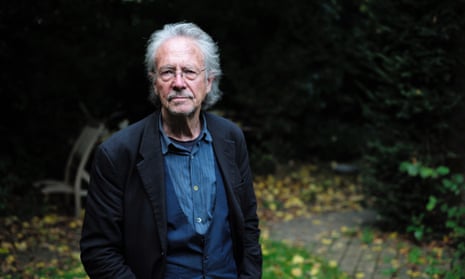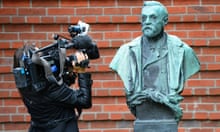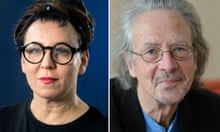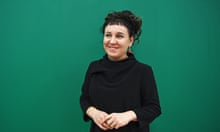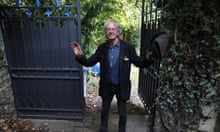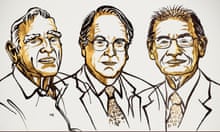It was, undoubtedly, Peter Handke’s years as a law student in Graz that made him such an adversarial talent. Instead of pursuing those petty courtroom battles, he broke off his legal studies and began a literary career full of confrontation. His generation had so much to argue with. Unlike German language authors before him, such as Günther Grass and Heinrich Böll – the latter Handke vehemently spoke out against when he burst onto the scene with his 1966 debut novel The Hornets – Handke seemed to pick a fight with language itself. For him, and his contemporaries Elfriede Jelinek and Thomas Bernhard, the entire German language bore the stain of Nazi abuse and needed to be recovered, word by word.
I still remember the experience of seeing his 1966 play Publikumsbeschimpfung, in Berlin in the seventies. In English translation it was called Offending the Audience – though the word “berating” seems more appropriate for a play made up of actors doing nothing but shouting at shocked and inspired audiences. He followed it up with Kaspar, a 1967 play based on the legend of Kaspar Hauser, the man who stumbled onto the streets of Nuremberg without any grasp of language. Handke’s characters attempt to speak, but their fight with words make them even more mute; it is as though they have become part of a post-Holocaust condition in which the world must rebuild everything, even linguistics, from scratch.
His striking titles have always pointed inwards at his own tumultuous, hugely original, and fearless literary force, like his more recent play, 2010’s Immer noch Sturm (Storm Still). His characters are often brought into the psychological laboratory to be tested for emotional inhibitors: like the central figure in 1972’s The Goalie’s Anxiety at the Penalty Kick, who descends into a traumatised moral vacuum to coldly murder a cinema cashier. (The novel was later filmed by Wim Wenders in 1975; Handke’s own film career would begin in three years after that, when he directed an adaptation of his own novel The Left-Handed Woman.)
Handke turned to more personal subjects in books like his 1972 novel Wunschloses Unglück (Sorrow Beyond Dreams), in which he wrote – without overt emotion – about the suicide of his Slovenian-born mother. She is described, not from the point of view of a son in mourning, but simply as the story of a woman who methodically lays out her clothes before calmly taking her own life.
Since then, his novels have continued that extraordinary life work of discovering human existence with forensic analysis, writing about all manner of subjects and attempting to explain them to us. An attempt by the author to travel deep into the landscape to find himself, an attempt at mushroom hunting, even an attempt at understanding the toilet.
It was a shock to see him taking up the cause of the Serbian war criminal Slobodan Milošević, going so far as to attend his trial in the Hague and later, his funeral. Perhaps it can be vaguely explained, if not forgiven, as part of Handke’s need to be awkward and wrong, that artistic impulse to uncover the hornet’s nest and get stung himself.
How will his fellow citizens in Austria view their latest controversial laureate, I wonder. When his compatriot Elfriede Jelinek won the prize some years ago, the Vienna tabloids blazed their fury and called her a Nestbeschmutzerin or “soiler of her own nest.” Will they do the same to Handke?
